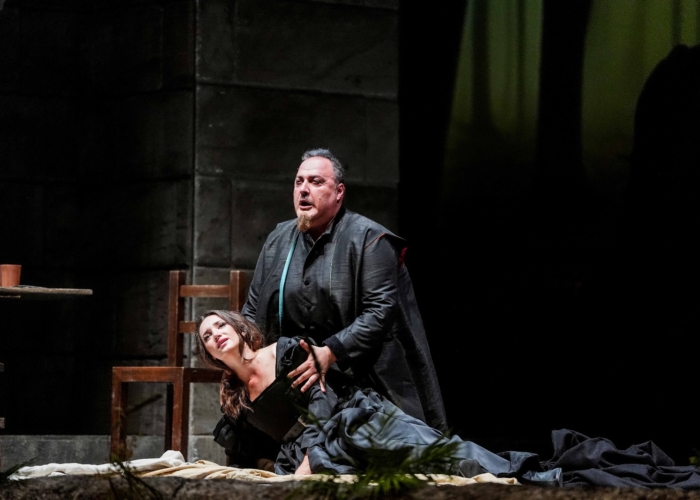
Review
|
15.11.2024
George Gagnidze is a “powerful, compelling, imposing” Rigoletto in Catania
“Giuseppe Verdi’s opera conducted by an expert Verdian conductor. And the world of “courtiers” revolves around Gagnidze’s voice.”
“The poisoned world of ‘courtiers, vil razza dannata’ revolves around him, but he is the one who makes the scene-world revolve. And let us praise the Rigoletto of baritone George Gagnidze, Georgian, powerful, compelling, imposing Falstaff-like physique yet highly agile, mimetic, direct, ruthless, and broken. And what does it matter that he exhibits no mountainous humps or right-angle posture? His “diversity” is riveting and deadly. For everyone. He is a hypnotic “singing actor.” Gagnidze shows excellent declamation and phrasing and a remarkable word command. And all this is much more than a corollary to his expressive and happily “bulky” physicality that reminds one in no small part of Ambrogio Maestri, an immense exponent of the highest craftsmanship of theater in music.”
“The magnificent “father” (of Gilda, ed.) Gagnidze!”
Carmelita Celi, La Sicilia
“Georgian baritone George Gagnidze did not disappoint expectations at all: a singer endowed with a remarkable stage presence and a burnished voice, a middle register with the wide and powerful sonorities of a true dramatic baritone, as well as impeccable diction and careful attention to the more properly actorly aspect of a complex and insidious character like Rigoletto, distinguished himself by a wide and sculptural declamato, but also by an elegiac vein that allowed him to find the right accents both in the duet with Gilda in Act I and in the opera’s finale, where his father’s despair emerged in all its tragic power. Of considerable emotional impact was the entire third scene of the second act, where voice and movements constituted a veritable dramatic apex, the climax of which was the very famous “Sì, vendetta, tremenda vendetta,” which unleashed the enthusiasm of the audience, to whose repeated requests for encores Gagnidze responded with gracious generosity by reprising the piece that constitutes, at least for the general public, the quintessence of Rigoletto.”
Giovanni Pasqualino, Bellini News
“As for the voices, the Georgian baritone George Gagnidze totally nailed the role of Rigoletto, with a convincing meaty wide-ranged vocal register intelligently expanded during the three acts, with the encore -unplanned but much appreciated by the audience- of the “tremendous revenge”: he also deserved the approval of the attentive Catanese opera lovers for his excellent acting skills.”
Francesco Giordano, Globus Magazine
“Beginning with the figure of the jester, portrayed by George Gagnidze, a deep voice in keeping with a score that is not lyrical but made up of bursts of declamato and always rhythmic, who does not appear on stage with a pronounced hump but simply limping and bending his torso forward. He did not want to load the desperate father in a ridiculous sense but accentuated his painful condition of loneliness and responsibility. Thus emerged a fragile Rigoletto, who at the beginning of the story encourages a profligate and unscrupulous ruler and revels in mocking the fortunes of others, but then reveals all his infinite love for Gilda, the young daughter oblivious to life and the evil around her.”
Loredana Pitino, In Scena Online
“Baritone George Gagnidze’s powerful voice…”
Anna Di Mauro, Script & Books
“Rigoletto was the celebrated Georgian baritone George Gagnidze, who sang with the correctness of his vast stage experience and performed, with subtle complicity, some vocal and scenic quirks of the opera’s director, his colleague Leo Nucci; moreover, given the replacement of the protagonist at the last minute, his ability to quickly adapt to the conditions dictated by the mystic gulf was noted as highly professional.”
Natalia Di Bartolo, OperaeOpera
[Photo by Giacomo Orlando]
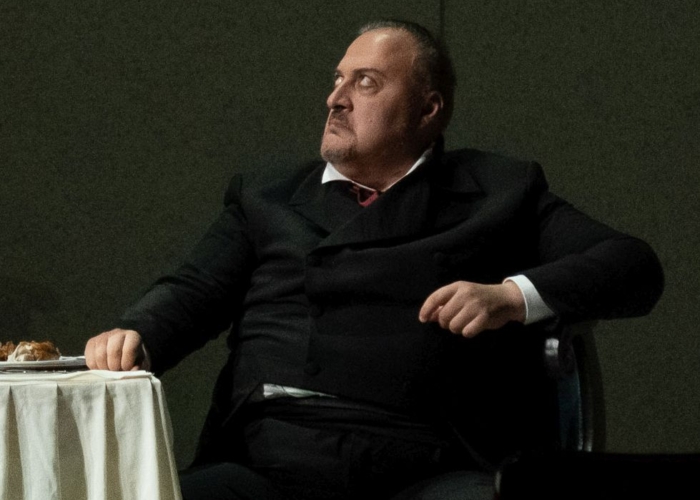
Review
|
16.10.2025
Reviews “Francesca da Rimini” in Turin
“George Gagnidze as her husband Gianciotto was excellent...” Paolo Gallarati, La Stampa
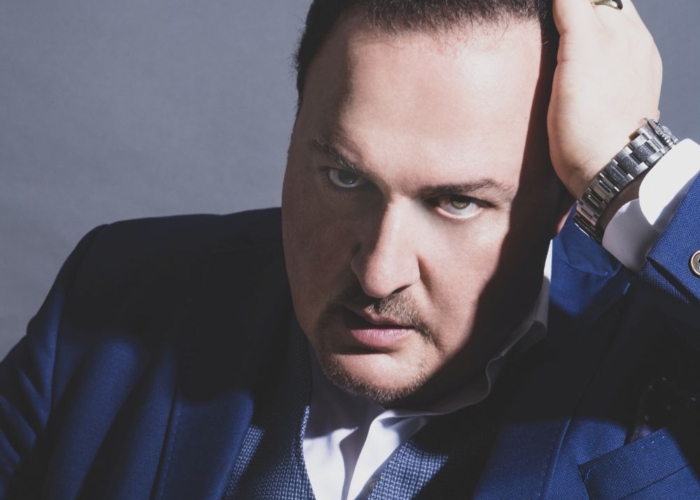
Review
|
10.10.2025
“L’Italia è la culla del mio repertorio”. L’intervista
di Giovanni Zambito - Il baritono George Gagnidze, tra le voci verdiane più autorevoli della scena lirica internazionale, si prepara a una nuova intensa stagione artistica che lo vedrà protagonista in Italia e all’estero. Dopo quasi 150 recite al Metropolitan di New York, Gagnidze tornerà nel Belpaese per tre appuntamenti di grande rilievo: Francesca da Rimini al Teatro Regio di Torino, Macbeth al Carlo Felice di Genova e Nabucco al Macerata Opera Festival. Parallelamente, sarà impegnato in importanti produzioni in Germania e Spagna, tra cui Der fliegende Holländer.
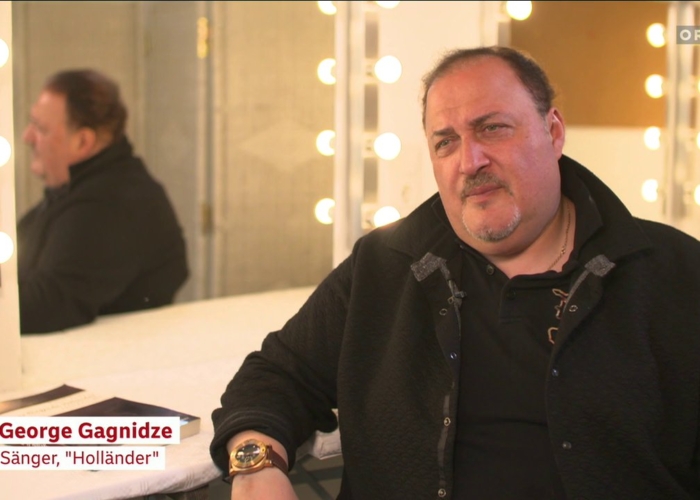
Interview
|
04.07.2025
Interview for ORF TV
In the lead-up to the premiere of Der fliegende Holländer at the Oper im Steinbruch Festival, George Gagnidze spoke with ORF TV about his role and the production in St. Margarethen. The interview, along with rehearsal footage, can be viewed here:
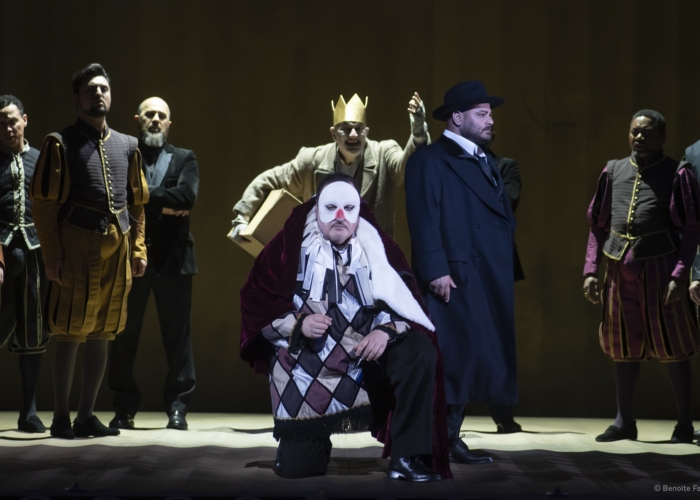
Interview
|
07.06.2025
Première Loge Interview
George Gagnidze recently spoke with Première Loge about his deep connection to Verdi and Rigoletto, the role he is currently singing at the Opéra national de Paris. The interview touches on his artistic journey, future projects, and his interpretation of one of opera’s most iconic characters.
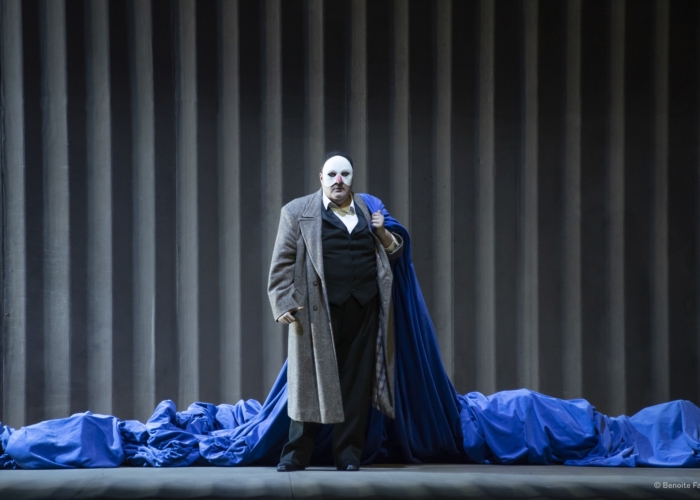
Review
|
06.06.2025
Press review “Rigoletto” in Paris, May/June 2025
“George Gagnidze, a veteran of his signature role, which he embodies masterfully with exemplary intelligence, (...) throws himself admirably into this demanding part: ... showing no noticeable signs of age ... he often reaches moments of true emotion, culminating in a faultless and particularly poignant finale.” François Lehel, Opéra




